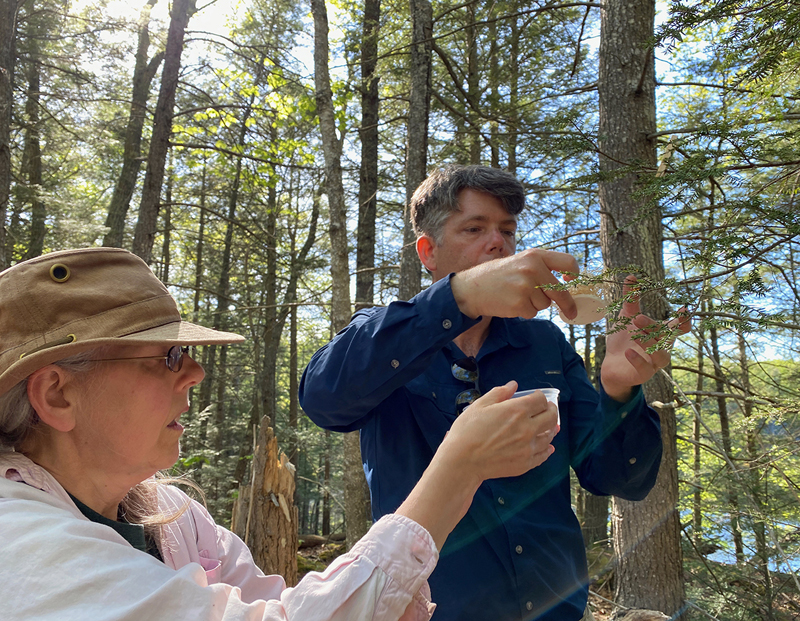
State entomologist Colleen Teerling and Coastal Rivers Executive Director Steven Hufnagel release predatory beetles onto a hemlock infested with the hemlock woolly adelgid insect near Half Moon Pond in Bristol. (Photo courtesy Coastal Rivers Conservation Trust)
When Joan Ray walked through the grove of ancient hemlocks at the Waldoboro Town Forest late last summer and spotted telltale white woolly masses on the underside of hemlock branches, she was filled with a sense of dread. The hemlock woolly adelgid insect, which is decimating hemlock trees throughout the eastern U.S., had infested this grove of hemlock trees, some of which pre-date the Revolutionary War.
The hemlock woolly adelgid is an invasive, aphid-like insect from Asia that attacks and kills North American hemlocks. The insects themselves are very small and hard to see, but can be easily identified by the 1/16 to 1/8-inch white woolly masses they form on the underside of branches at the base of the needles on hemlock trees.
Unlike the native woolly adelgid that one sometimes sees on alders, hemlock woolly adelgid are specific only to hemlock and often fatal to the host tree.
Ray, who is director of land conservation at Coastal Rivers Conservation Trust, immediately took action and notified the Waldoboro town officials, as well as the state entomologist.
There are a number of treatment options, including several types of predatory beetles which attack the adelgid. These are often used in concert with organic horticultural oils or limited application of insecticides. The organic oils or insecticides will protect the trees until the beetle populations have grown enough to bring the numbers of adelgid under control.
The Maine state entomologist, Colleen Teerling, was able to acquire a batch of 2,000 predatory beetles from the federal government. In the fall of 2021, Ray, Teerling, Waldoboro Town Manager Julie Keizer, and individuals from the Waldoboro Conservation Commission released the beetles onto select trees in the Waldoboro Town Forest.

Hemlock woolly adelgid forms white woolly masses on the undersides of hemlock branches. The wool is actually a waxy protective coating. (Photo courtesy Coastal Rivers Conservation Trust)
“Coastal Rivers provided expertise throughout the process,” said Keizer. “Without their help identifying the problem and bringing in the right partners, we wouldn’t be so far along in the process of eradicating the adelgid.”
The beetles have been extensively tested, both in the lab and in the wild, to ensure they don’t attack native species and become invasive pests themselves. Once released, they will feed, reproduce, and spread as long as there are adelgids present in sufficient numbers to sustain them.
In the meantime, Coastal Rivers is monitoring the spread of hemlock woolly adelgids on its own conserved properties in the Damariscotta-Pemaquid area, and targeting infested hemlock groves for treatment with the predatory beetle. Several hundred predatory beetles were released recently at Keyes Woods Preserve and the Half Moon Pond Conservation Area in Bristol.
Coastal Rivers is spearheading further efforts to protect the region’s hemlocks in partnership with other land trusts, towns, conservation commissions, and individuals. For example Coastal Rivers is coordinating a third beetle release along the River~Link wildlife corridor and the Schmid Preserve in Newcastle and Edgecomb.
The land trust is also assisting landowners with identifying and evaluating infestations on private property, and is collaborating with individuals and organizations to secure the expensive predatory beetles at bulk rates.
Landowners who suspect they have hemlock woolly adelgid on their property, particularly in the towns of Bremen, Bristol, Damariscotta, Edgecomb, Newcastle, Nobleboro, and South Bristol, are encouraged to contact Coastal Rivers by emailing hwa@coastalrivers.org to help with identification and recommend a course of action.
Hemlock woolly adelgids can easily spread by hitching a ride on birds and animals, including people. Anyone who thinks they may have come in contact with infested trees should avoid spreading the insect to healthy trees by putting all of their clothes in the dryer on high heat for at least 15 minutes.
Coastal Rivers is a non-profit, member-supported, nationally accredited land trust caring for the lands and waters of the Damariscotta-Pemaquid Region by conserving special places, protecting water quality, creating trails and public access, and deepening connections to nature through education programs. For more information, email info@coastalrivers.org or visit coastalrivers.org.



